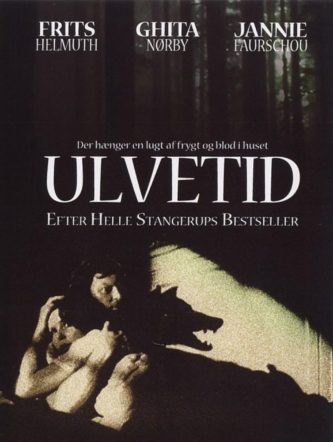 A most interesting and unorthodox “horror” movie from Denmark. This 1981 release is not, as has been wrongly claimed, a werewolf thriller (although the specter of lycanthropy is brought up), but rather a quasi-art film that appears to have been patterned after the cinema of Ingmar Bergman. Adapted from a novel by Helle Stangerup, it’s a triumph from director Jens Ravn, who previously made the science fiction classic MANDEN DER TAENKTE TUNG/THE MAN WHO THOUGHT LIFE (1969).
A most interesting and unorthodox “horror” movie from Denmark. This 1981 release is not, as has been wrongly claimed, a werewolf thriller (although the specter of lycanthropy is brought up), but rather a quasi-art film that appears to have been patterned after the cinema of Ingmar Bergman. Adapted from a novel by Helle Stangerup, it’s a triumph from director Jens Ravn, who previously made the science fiction classic MANDEN DER TAENKTE TUNG/THE MAN WHO THOUGHT LIFE (1969).
ULVETID (THE WOLF HOUR) begins in a deceptively cozy seaside cottage where a famous writer named Tom and his pregnant wife Anna, who suffers from depression, reside. One day Tom receives a letter from a young woman admirer asking for help with her pet wolf.
Anna, chasing the letter into the cellar, falls down the stairs and miscarries. Shortly afterward Tom invites the woman, named Ellinor, and her wolf pet to stay in the cottage.
Upon arriving Ellinor puts her wolf up in a large cage located outside the cottage. Her presence serves to further strain Tom and Anna’s already rickety marriage, and it certainly doesn’t help matters that Ellinor shows an unnatural affection for the wolf. Before long Ellinor adds a second wolf, and then a third, fourth, fifth and sixth, all without informing Anna—to whom Ellinor is quite remote and standoffish. To Tom, on the other hand, she’s quite inviting, showering him with nearly as much affection as she does her wolves. He returns her affections, seizing on the opportunity to use her wolves as a research for a book he’s writing on the subject.
Things grow increasingly fraught as Ellinor insists on hauling tons of meat into the house to feed her wolves, making the place smell like decaying flesh, and Tom and Anna’s pet dog disappears. Eventually Tom comes to share Anna’s apprehensions about Ellinor, and begins to suspect that she might be a werewolf.
Many commentators have complained that very little actually happens in ULVETID, which is true. It’s very much a mood piece, and an arty one with lots of dissolves, a borderline-surreal color scheme that (in the manner of the aforementioned Ingmar Bergman) makes frequent use of the color red and a carefully wrought atmosphere that shifts from mild apprehension to stark terror. Throughout it all the viewer is kept constantly off-guard, torn between sympathizing with Anna, struggling with a distant husband and a much-younger rival, and Ellinor, who’s trying to pursue her (admittedly odd) passions in the company of what increasingly appear to be two maniacs.
It’s bolstered by an excellent sense of place. The seaside cottage setting becomes a character in itself, and one as important in its way as the all-too-human trio who drive the drama. The eighties centric music score and zoom-happy camerawork date the film, which works nonetheless due to the underlying power of its narrative, and the performances of Ghita Nørby (Anna), Frits Helmuth (Tom) and Jannie Faurschou (Ellinor).
None of this, however, quite forgives the obnoxiously inconclusive ending, which even by European art film standards is abrupt and unsatisfying.
Vital Statistics
ULVETID (WOLF HOUR)
Det Danske Filmstudie
Director: Jens Ravn
Screenplay: Jens Ravn
(Based on a novel by Helle Stangerup)
Cinematography: Henning Bendtsen
Editing: Lars Brydesen
Cast: Ghita Nørby, Frits Helmuth, Jannie Faurschou, Henning Rohde
